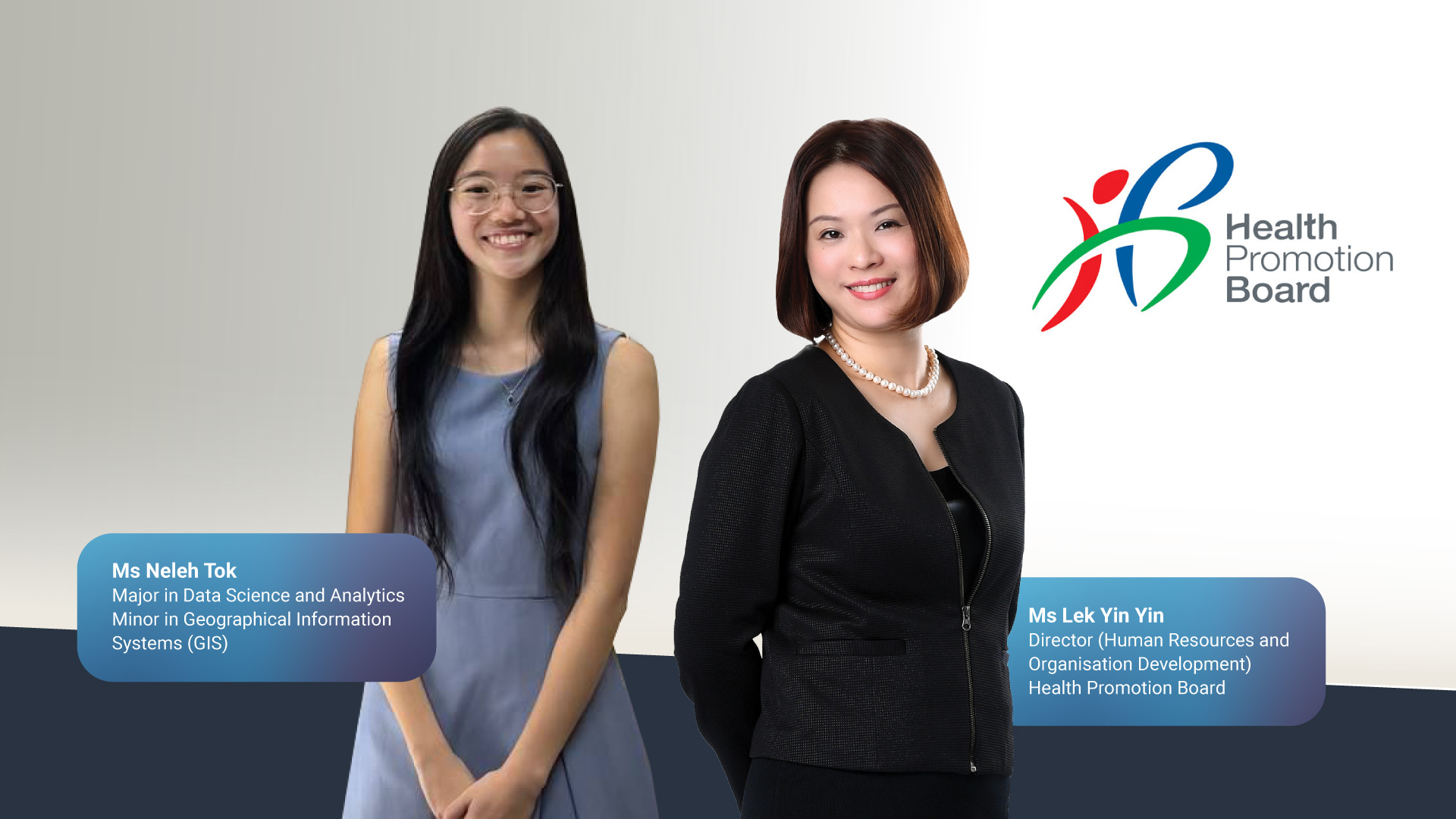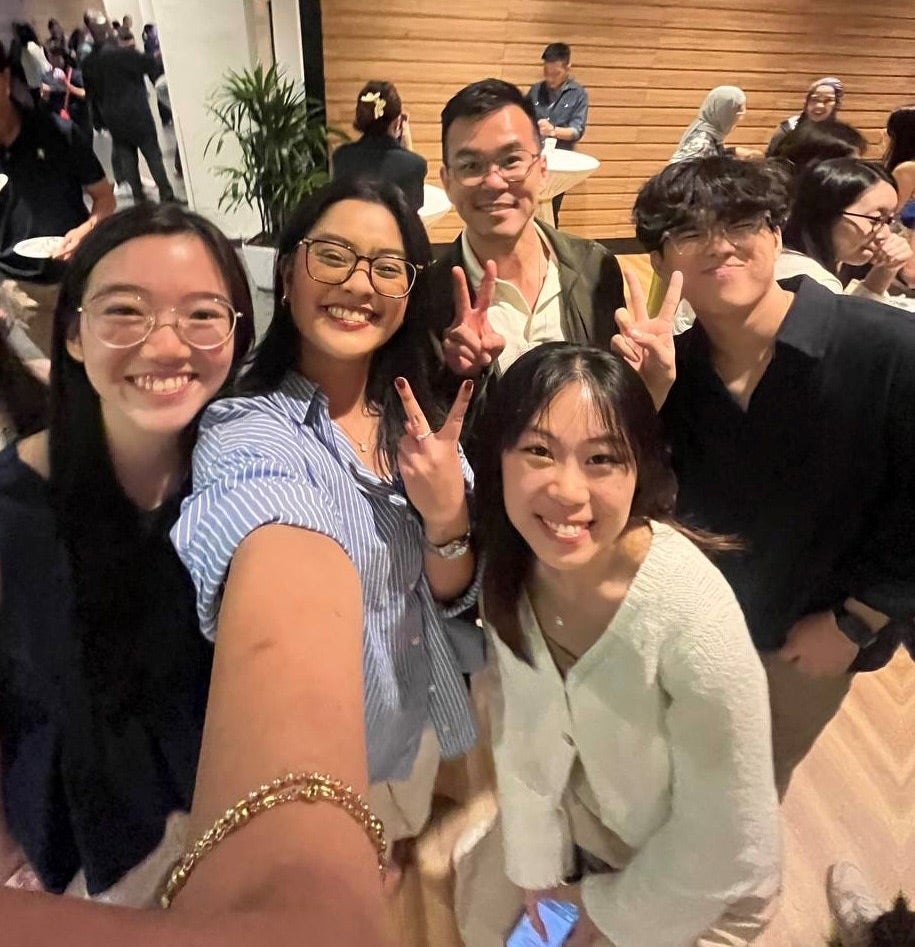Data for smarter health promotion
August 6, 2025

NUS College of Humanities and Sciences (Faculty of Science) student Neleh Tok aspires to a future career in data science, especially in the public service, as she believes that this enables her to apply the skills she learns in school for “the public good as well as to serve the needs of my country.”
Increased data adoption in the public sector has shaped the way in which public policies are designed, implemented and delivered. It was with this in mind - the prospect of gaining meaningful learning opportunities at the intersection of data science and public policy that contribute to positive social impacts - that Neleh decided to join the Health Promotion Board (HPB) as a Data Analyst intern.
Interns with interdisciplinary training have added value to HPB’s work, notes Ms Lek Yin Yin, HPB’s Director (Human Resources and Organisation Development). She says, “Such interns have contributed to both the technical and social aspects of public health work, ultimately leading to more effective health promotion strategies.”
Indeed, internships have evolved far beyond being a one-sided learning experience for students; today, they are a dynamic, mutually beneficial partnership between aspiring professionals and hiring managers. Catch our wide-ranging interview with Ms Lek and Neleh, who share on the strategic importance of internships from their own perspectives.

On the skills and attributes that are valued at the workplace, and specifically, the public health sector.
Lek Yin Yin (LYY) We emphasise a balanced combination of technical capabilities and soft skills. To excel in our area of work, candidates should demonstrate strong technical competencies in data analysis, research methodology and digital literacy, along with a solid understanding of public health principles. We also value soft skills such as adaptability, learning agility and initiative, as our dynamic healthcare environment requires innovation, experimentation and quick adjustment to new challenges.
Neleh Tok (NT) This internship was a great opportunity to apply the technical concepts and skills I learned in NUS while also learning additional workplace skills beyond academics. For instance, I acquired soft skills such as professional communication and presentation skills. I also learned that data analytics goes beyond just cleaning and presenting data - understanding the project flow, scope and objectives is also very important to come up with accurate and useful insights and recommendations.
On the value of interdisciplinary training
LYY Health promotion and public health work require a multidisciplinary and ecosystem-based approach. This is why teamwork, stakeholder management and communication skills are essential. Interns who can effectively engage with stakeholders, clearly articulate business cases and get complex ideas across will have an added advantage to excel. Those with such skills have demonstrated abilities in translating complex health information into simple, digestible content targeted at different population segments. For example, in the development of health intervention programmes, we consider not just the scientific validity but also the social and cultural factors that make a difference in influencing participation, impact and overall programme success.
This interdisciplinary approach is particularly valuable in stakeholder engagement. Interns who understand both technical aspects and social dynamics are more effective in building partnerships and implementing programmes. They bridge the gap between scientific evidence and practical implementation, leading to more successful delivery of our health promotion initiatives.
NT An interdisciplinary education provides additional perspectives unique to each discipline which showcases how many seemingly separate disciplines can actually be interconnected and complementary. For instance, from my major in Data Science and Analytics, I focus on how to use and analyse existing data that is already collected. But my minor in Geographical Information Systems (GIS) sheds light on how data is actually collected and generated in the first place.
On the overall work readiness of NUS Science graduates
LYY We particularly value the technical and analytical capabilities of science graduates. Many are able to quickly adapt to new technologies and systems and possess strong problem-solving skills, evident by how they managed complex projects across departments.
NT My internship provided clarity on what type of career in data science I want to pursue. I will definitely apply the soft skills and corporate skills I picked up from my HPB experience in my future work, as well as presentation skills and data communication to non-technical management.

On on-the-job training
LYY As with every job, it is important to have a good understanding of the organisation’s business operations and organisational dynamics. For instance, in our Data Science team, many interns excel at analysis but require guidance to present findings in a way that can best resonate with stakeholders. To address this, we have implemented mentoring programmes that bridge these gaps and we have seen positive results. Many interns have grown professionally during their time with us. We have observed their growing confidence in presenting ideas and strategic thinking over time.
NT The hands-on experience I gained allowed me to translate theoretical knowledge into practical solutions. My main internship responsibilities were to use tools to process, clean and visualise data from various sources such as participation and survey data. I then put together analysis decks with observations of trends, insights and recommendations. For instance, I developed a dashboard to analyse trends and participation rates of parents, which enabled data-driven outreach strategies to boost onboarding. I also gained insights into the workflow and considerations that underlie decision-making.
On emerging skills and competencies that future science graduates should focus on developing
LYY Some of the important skills for the fast-changing health landscape include:
- Data storytelling: Translating complex health data into compelling, actionable insights. Beyond data analysis, it is important to be able to craft narratives that drive decision-making and behaviour change
- Digital transformation skills: Understanding how technology is reshaping preventive health delivery and using new digital tools to enhance our initiatives
- Cross-disciplinary thinking: Integrating scientific knowledge with social and behavioural insights to develop effective health interventions
- Change management skills and human-centred design thinking: Effective communication and enhancing user-centred experience can better encourage buy-in across different stakeholder groups, leading to more effective change
On internship opportunities at HPB
LYY Across HPB, we provide internship opportunities that expose them to real-world public health challenges.
Our internship programme focuses on active participation where interns work with experienced professionals, tackling existing public health challenges and contributing to solutions that have a direct impact on health outcomes in the community.
The Chief Data Officer's Office regularly hosts Data Science and Analytics interns who work on projects involving health data analysis and system architecture. For instance, one of our interns successfully managed multiple technical projects, including data pipeline development and system implementation.
Our Research and Development division offers opportunities for Psychology students to engage in evidence-based research and programme evaluation. These roles involve analysing the effectiveness of health interventions and developing policy recommendations, giving interns exposure to public health programmes development.
NUS students who have interned with us have demonstrated their ability to apply what they have learnt. Data Science and Analytics students who worked on our projects have transformed health data to insightful data visualisation, creating intuitive, user-friendly visualisations that can effectively communicate key health messages to stakeholders.

